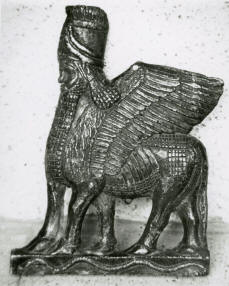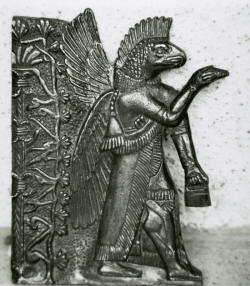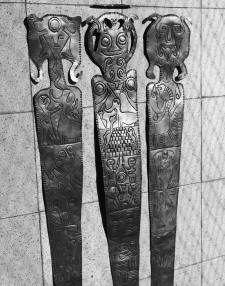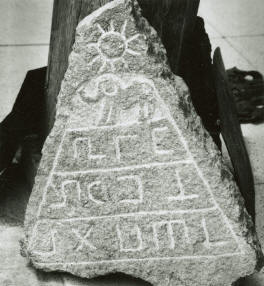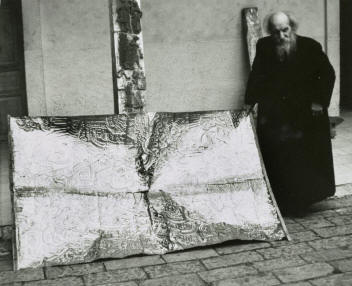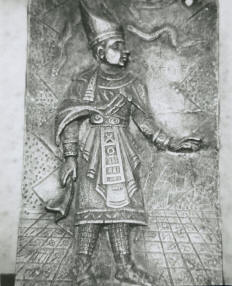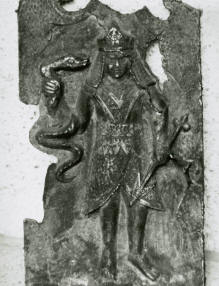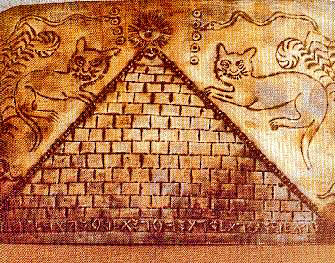|

from
GoldLybrary Website
In the World Explorers Club magazine,
David Hatcher Childress has added a
photographic section on Father Crespi at the end of the 'Metal Library of
Atlantis' article.
|

The
enigmatic Crespi plate. Magyar? Sanskrit? Pali? |
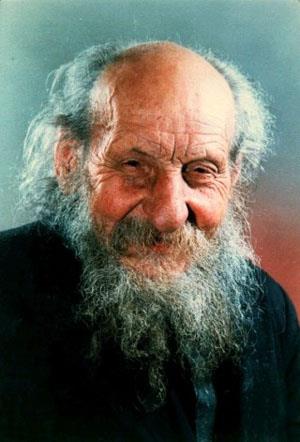
Father Crespi
|
Salesian Padre Carlos Crespi Croci, born in Italy in 1891, dedicated his
life to Ecuador from 1923 to 1982.
Educator, anthropologist, botanist,
artist, explorer, cinematographer, humanitarian and musician, his
unfathomable wealth of talents and benevolence served and illuminated rich
and poor alike, in recognition of which an impressive sculpture to his
memory was erected in Cuenca, his adopted city, by an adoring populace.
After meeting Padre Crespi (see photo) in 1975-76, presbyterian-raised Stan
Hall declared to a friend,
‘If ever I felt I'd been in the presence of a
Saint it was Padre Crespi!’

Hall with Padre Crespi,
Cuenca 1976
A Tribute to Padre Crespi - Born a Saint
The film excerpt below is from ‘Los Invencibles Shuar del Alto Amazons’ shot
in 1927 by Salesian Padre Carlos Crespi, the first film of Shuar community
life and culture ever made.
The Shuar-Achuar population of Ecuador numbers
70,000 over 400 communities. They are called ‘Invincibles’ because neither
Incas nor Conquistadores could dominate them.
In the 1990s Stan Hall, an
‘Honorario Vitalicio’ and International Representative of the Shuar
Federation, mediated the release of an Ecuadorian Atomic Energy delegation
taken prisoner because it arrived in a Shuar community unannounced. The only
words the Shuar associated with Atomic Energy were ‘Hiroshima’ and
‘Nagasaki’.
After consulting specialized geologists Hall convinced Shuar and
Achuar representatives in Quito that uranium deposits in their territory
were negligible and of no commercial value.
The Crespi Collection
from
FOK!
Website
Many may not be familiar with what we call the Crespi Collection, but it
was/is one of the more amazing collection of artifacts from South & Central
America that has every been brought together.
Father Carlos Crespi was a Silesian-monk who lived in Ecuador. He did
missionary work among the Indian population in remote valleys during his
lifetime.
Crespi received or bought many artifacts from the indigenous people in
Ecuador.
When questioned, they told him they had found them in subterranean cave
systems in the jungles. As time progressed, many of these relics were
brought together and kept in the courtyard of the church Maria Auxiliadora.
Unfortunately, many of the artifacts were destroyed in a fire in 1962 or
later when the church was restored. Also, many were lost or wound up with
treasure hunters.
After Father Crespi passed away, the remaining artifacts of the original
collection were removed and made inaccessible to the public.
Some may still be stored in the cellar archive of the church Maria
Auxiliadora.
The age and origin of these items is still unknown today. Father Crespi
never tried to classify them. The picture motifs are strange, their meaning
not understood. These objects show the pictures of an unknown culture.
Were
they left by unknown civilizations?
The most well known pieces are tablets made of silver, gold foil or other
alloys with unknown letters and mysterious symbols.

|





